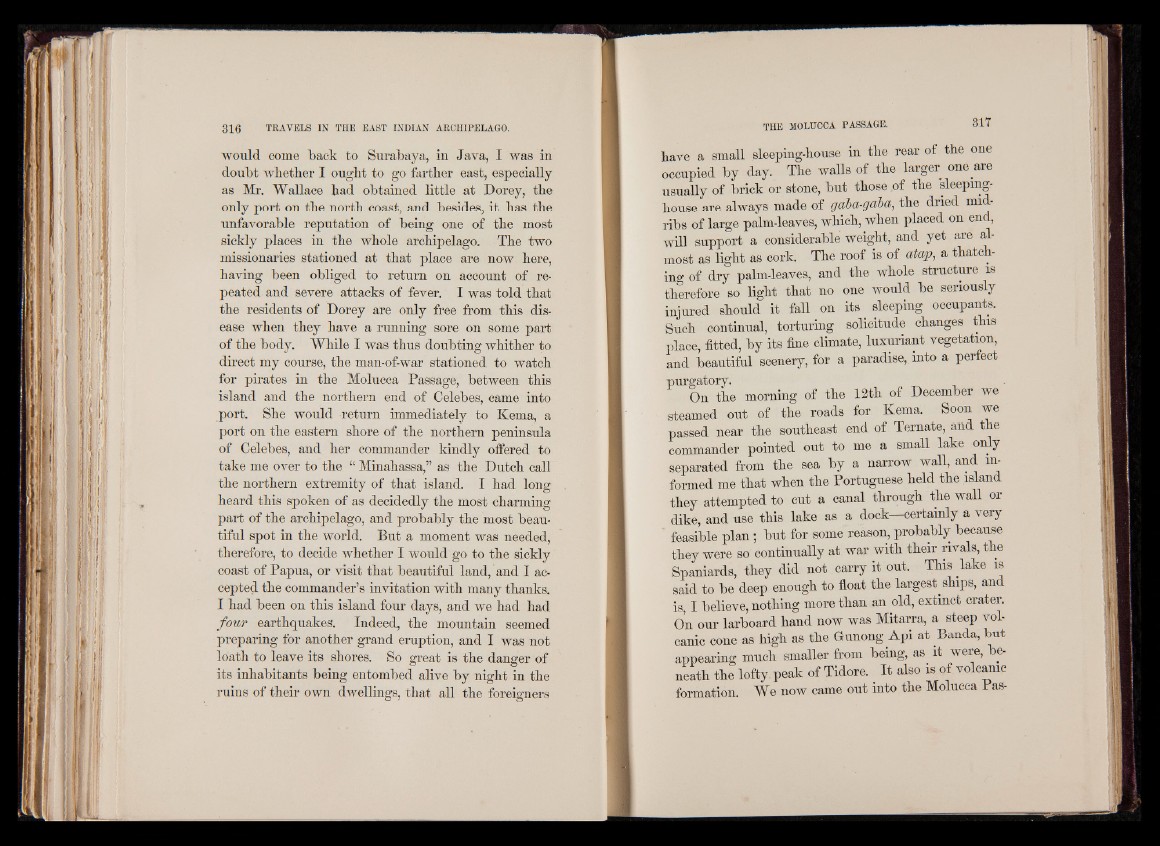
would come back to Surabaya, in Java, I was in
doubt whether I ought to go farther east, especially
as Mr. Wallace had obtained little at Dorey, the
only port on the north coast, and besides, it has the
unfavorable reputation of being one of the most
sickly places in the whole archipelago. The two
missionaries stationed at that place are now here,
having been obliged to return on account of repeated
and severe attacks of fever. I was told that
the residents of Dorey are only free from this disease
when they have a running sore on some part
of the body. While I was thus doubting whither to
direct my course, the man-of-war stationed to watch
for pirates in the Molucca Passage, between this
island and the northern end of Celebes, came into
port. She would return immediately to Kema, a
port on the eastern shore of the northern peninsula
of Celebes, and her commander kindly offered to
take me over to the “ Minahassa,” as the Dutch call
the northern extremity of that island. I had long
heard this spoken of as decidedly the most charming
part of the archipelago, and probably the most beautiful
spot in the world. But a moment was needed,
therefore, to decide whether I would go to the sickly
coast of Papua, or visit that beautiful land, and I accepted
the commander’s invitation with many thanks.
I had been on this island four days, and we had had
fo u r earthquakes. Indeed, the mountain seemed
preparing for another grand eruption, and I was not
loath to leave its shores. So great is the danger of
its inhabitants being entombed alive by night in the
ruins of their own dwellings, that all the foreigners
have a small sleeping-house in the rear of the one
occupied by day. The walls of the larger one are
usually of brick or stone, but those ,of the sleeping-
house are always made of gaba-gaba, the dried midribs
of large palm-leaves, which, when placed on end,
will support a considerable weight, and yet are almost
as light as cork. The roof is of atcup, a thatching
of dry palm-leaves, and the whole structure is
therefore so light that no one would be seriously
injured should it fall on its _ sleeping occupants.
Such continual, torturing solicitude changes this
place, fitted, by its fine climate, luxuriant vegetation,
and beautiful scenery, for a paradise,, into a perfect
purgatory.
Oil tlie morning of the 12th. of December we
steamed out of the roads for Kema. Soon we
passed near the southeast end of Ternate, and the
commander pointed out to me a small lake only
separated from the sea by a narrow wall, and informed
me that when the Portuguese held the island
they attempted to cut a canal through the wall or
dike, and use this lake as a dock—certainly a very
feasible plan ; but for some reason, probably because
they were so continually at war with their rivals, the
Spaniards, they did not carry it out. This lake is
said to be deep enough to float the largest ships, and
is, I believe, nothing more than an old, extinct crater.
On our larboard hand now was Mitarra, a steep volcanic
cone as high as the G-unong Api at Banda, but
appearing much smaller from being, as^ it were, beneath
the lofty, peak of Tidore. ? It also is of volcanic
formation. We now came out into the Molucca Pas